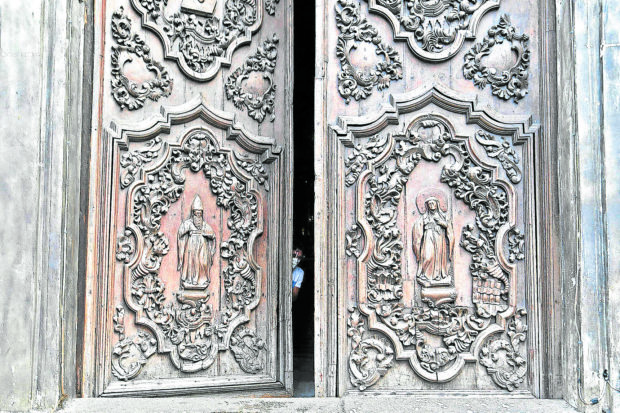DOH tags Metro Manila as ‘high risk’ as PH records 6,666 new COVID-19 infections

ICONIC CHURCH ON LOCKDOWN A worker closes the main door of the four-century-old San Agustin Church in Intramuros, Manila, after a wedding in this photo taken on Sunday. The church has since been placed on lockdown after its 45-year-old parish priest, Fr. Arnold Sta. Maria Cañoza, died of COVID-19 on that day.—RICHARD A. REYES
MANILA, Philippines — COVID-19 cases in the Philippines have surpassed the peak recorded in July-August last year, and Metro Manila is now a “high risk” region for infection, the Department of Health (DOH) said on Wednesday.
Speaking at a news briefing, Dr. Alethea de Guzman, the director of the DOH epidemiology bureau, said COVID-19 cases in Metro Manila had reached a “new peak,” meaning cases in all parts of the metropolis were higher in number than at the peak of the pandemic last year.
Data from the DOH as of Wednesday showed that cases in several cities in Metro Manila had increased by more than 200 percent over the numbers in the previous three to four weeks, including Marikina (296 percent), Mandaluyong (255 percent), Caloocan (252 percent), San Juan (248 percent), Pasig (237 percent), Muntinlupa (226 percent), Pateros (222 percent), Quezon City (217 percent) and Parañaque (215 percent).
Pasay City and Malabon also saw increases of over 200 percent in cases, the DOH said.
Marikina, Mandaluyong, Caloocan, San Juan, Pasig, Muntinlupa, Pateros, Quezon City and Parañaque are now considered “critical,” while other cities in the metropolis are now classified as “high risk,” it said.
Article continues after this advertisementMore cases
On Wednesday, the DOH logged 6,666 additional coronavirus infections, bringing the overall number of confirmed COVID-19 cases in the country to 684,311.
Article continues after this advertisementThe DOH reported that 1,072 people had recovered, pushing the total number of COVID-19 survivors in the country to 579,518. But 47 other patients had died, it said, raising the death toll to 13,039.
Left were 91,754 active cases, of which, the DOH said, 95.3 percent were mild, 2.5 percent asymptomatic, 0.46 percent moderate, 0.9 percent severe, and 0.8 percent critical.
Hospitals in the metropolis are nearing capacity and some are adding beds to handle rising cases.
East Avenue Medical Center in Quezon City hit 90 percent occupancy on Wednesday and the hospital, according to Dr. Dennis Ordoña, the hospital spokesperson, could hit capacity within the week if cases did not go down.
Ordoña said the hospital planned to add 50 beds in the emergency room to handle COVID-19 cases.
“There are more cases now [compared to the July-August 2020 surge] but we have allocated more beds now. We have more information about the disease so we are more prepared now,” he said.
Longer curfew
In San Juan, the tents outside Cardinal Santos Medical Center that served as receiving areas were full on Wednesday.
“What we do is we check first the severity of the patient. If they are asymptomatic or just mild, if their homes are quite tight and the chances of infection are high, we then move them to our local government quarantine[s]. Even San Juan Medical Center is being used for isolation,” Mayor Francis Zamora said in a television interview.
While the surge in cases is reminiscent of the peak recorded in August last year, Zamora said the local government strove to curb the spread of the coronavirus through early implementation of a longer curfew throughout the city.
Zamora said he agreed with the government’s decision to expand the curbs to neighboring Bulacan, Cavite, Laguna and Rizal provinces as it would restrict people’s movement during Holy Week and slow the spread of the virus.
—WITH REPORTS FROM NIKKA G. VALENZUELA AND MEG ADONIS
For more news about the novel coronavirus click here.
What you need to know about Coronavirus.
For more information on COVID-19, call the DOH Hotline: (02) 86517800 local 1149/1150.
The Inquirer Foundation supports our healthcare frontliners and is still accepting cash donations to be deposited at Banco de Oro (BDO) current account #007960018860 or donate through PayMaya using this link.